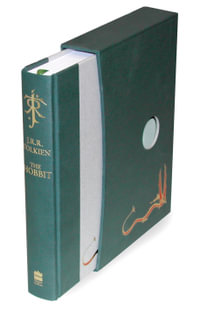The tale of Beren and Lúthien was, or became, an essential element in the evolution of The Silmarillion, the myths and legends of the First Age of the World conceived by J.R.R. Tolkien. Returning from France and the battle of the Somme at the end of 1916, he wrote the tale in the following year. Essential to the story, and never changed, is the fate that shadowed the love of Beren and Lúthien: for Beren was a mortal man, but Lúthien was an immortal Elf. Her father, a great Elvish lord, in deep opposition to Beren, imposed on him an impossible task that he must perform before he might wed Lúthien.
This is the kernel of the legend; and it leads to the supremely heroic attempt of Beren and Lúthien together to rob the greatest of all evil beings, Melkor, called Morgoth, the Black Enemy, of a Silmaril. In this book Christopher Tolkien has attempted to extract the story of Beren and Lúthien from the comprehensive work in which it was embedded; but that story was itself changing as it developed new associations within the larger history. To show something of the process whereby this legend of Middle-earth evolved over the years, he has told the story in his father's own words by giving, first, its original form, and then passages in prose and verse from later texts that illustrate the narrative as it changed.
Presented together for the first time, they reveal aspects of the story, both in event and in narrative immediacy, that were afterwards lost.
About the Author
John Ronald Reuel Tolkien (1892-1973) was a major scholar of the English language, specializing in Old and Middle English. Twice Professor of Anglo-Saxon (Old English) at the University of Oxford, he also wrote a number of stories, including most famously The Hobbit (1937) and The Lord of the Rings (1954-1955), which are set in a pre-historic era in an invented version of the world which he called by the Middle English name of Middle-earth. His books have been translated into more than fifty languages and sold more than 100 million copies.
Christopher Tolkien is the third son of J.R.R. Tolkien. Appointed by Tolkien to be his literary executor, he has devoted himself to the editing and publication of unpublished writings, notably The Silmarillion, Unfinished Tales, and The History of Middle-earth.
Alan Lee was born in England in 1947. Inspired by Tolkien's work to pursue his chosen path as an artist of the mythic and fantastic, he has illustrated a wide range of books including Faeries, The Mabinogion, Castles, Merlin Dreams, the centenary edition of The Lord of the Rings, and The Hobbit. He is a winner of the Carnegie Medal for his illustrated edition of The Illiad.
Industry Reviews
Praise for The Children of Hurin:
'I hope that its universality and power will grant it a place in English mythology'
Independent on Sunday
'The darkest of all Tolkien's tales. Alan Lee's illustrations complement the writing splendidly'
Times Literary Supplement












